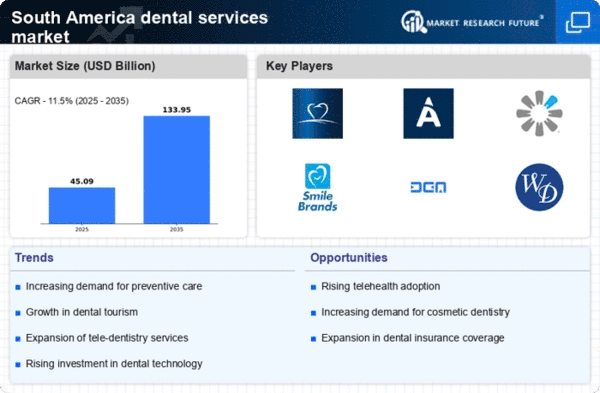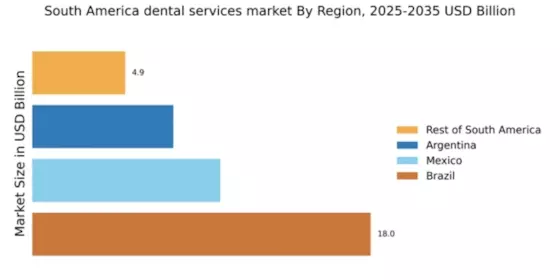Increasing Disposable Income
The rise in disposable income among the South American middle class appears to be positively influencing the dental services-organization market. As individuals experience improved financial conditions, they are more inclined to invest in their oral health. This trend is particularly evident in urban areas, where access to dental services is more prevalent. Reports indicate that spending on dental care has increased by approximately 10% in recent years, reflecting a shift in consumer behavior towards prioritizing dental health. Consequently, dental organizations are likely to see a surge in demand for their services, further driving market expansion.
Rising Oral Health Awareness
The increasing awareness of oral health among the South American population appears to be a significant driver for the dental services-organization market. Educational campaigns and initiatives by health organizations have led to a greater understanding of the importance of dental hygiene. As a result, more individuals are seeking regular dental check-ups and preventive care services. This trend is reflected in the rising demand for dental services, with a reported growth rate of approximately 8% annually in the region. The dental services-organization market is likely to benefit from this heightened awareness, as consumers prioritize their oral health and seek professional care.
Growth of Dental Insurance Plans
The expansion of dental insurance coverage in South America is likely to be a significant driver for the dental services-organization market. As more individuals gain access to dental insurance, the financial barriers to seeking dental care are reduced. This trend is particularly notable in countries where insurance penetration has increased by over 20% in the last few years. With insurance plans covering a wider range of dental services, patients are more likely to seek preventive and restorative treatments. This shift is expected to bolster the dental services-organization market, as organizations adapt to the changing landscape of insurance coverage.
Government Initiatives and Regulations
Government initiatives aimed at improving healthcare access and quality in South America seem to play a crucial role in shaping the dental services-organization market. Various countries in the region have implemented policies to enhance dental care accessibility, particularly in underserved areas. For instance, public health programs that subsidize dental treatments have been introduced, potentially increasing the patient base for dental organizations. Furthermore, regulatory frameworks that promote quality standards in dental practices are likely to enhance consumer trust. This supportive environment may lead to a projected market growth of around 6% over the next few years.
Technological Integration in Dental Practices
The integration of advanced technologies in dental practices is emerging as a pivotal driver for the dental services-organization market. Innovations such as digital imaging, tele-dentistry, and electronic health records are transforming how dental services are delivered. These technologies not only improve the efficiency of dental practices but also enhance patient experiences. For instance, the adoption of digital tools has been associated with a 15% increase in patient satisfaction rates. As dental organizations in South America continue to embrace these technological advancements, they are likely to attract more patients, thereby contributing to market growth.


















